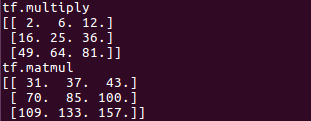tf.multiply() and tf.matmul() are common used functions in tensorflow, what is the difference between them?
tf.multiply() : compute the hadamard product of two tensors.
If matrix A is m*p and B is m*p.
c = tf.multiply(A,B) , c is also m * p
tf.matmul(): compute the matrix product of two tensors.
If matrix A is m*p and B is p * n
c = tf.matmul(A,B) , c is m * n
Here is an example to illustrate the difference between them.
import tensorflow as tf;
import numpy as np
matrix_a = tf.constant([[1,2,3],[4,5,6],[7,8,9]], dtype=tf.float32)
matrix_b = tf.constant([[2,3,4],[4,5,6],[7,8,9]], dtype=tf.float32)
matrix_c = tf.multiply(matrix_a,matrix_b)
matrix_d = tf.matmul(matrix_a,matrix_b)
init = tf.global_variables_initializer()
init_local = tf.local_variables_initializer()
with tf.Session() as sess:
sess.run([init, init_local])
np.set_printoptions(precision=4, suppress=True)
c, d= (sess.run([matrix_c, matrix_d]))
print 'tf.multiply'
print c
print 'tf.matmul'
print dThe output is:

From the output, you will find tf.muttiply() and tf.matmul() is not the same on the same tensor a and b.